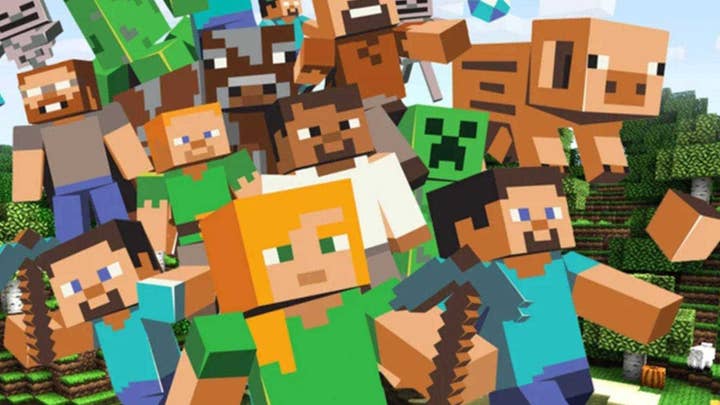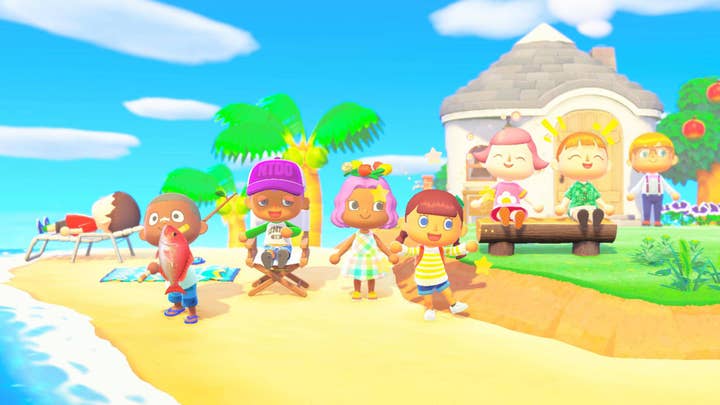Forget power fantasies: pandemic-era players crave companionship | Opinion
Games that provide relaxed, social experiences have always had appeal -- their newfound importance will be a lasting effect of the pandemic
As we cautiously tiptoe into a new year -- hoping in this instance that it's more of a reboot than a direct sequel -- it might seem a little naïvely optimistic to start by thinking about how things will pan out once the world has gone "back to normal," or at least receded to whatever form the "new normal" is going to take. With many countries experiencing soaring case counts and going back into lockdowns or states of emergency, while new strains of the virus wreak havoc and the promising vaccination programs struggle through early bureaucratic teething troubles, even hinting at a timeline for a return to normality is a fraught thing, let alone pondering what that normality might bring.
Within the relatively sheltered confines of the games industry, though, there are at least a few things we can glean, or at least discuss, about how the future beyond the pandemic is shaping up. Much of the industry's focus when it comes to talking about the "new normal" has been on its impact on work practices, and I've argued before that the balancing act between the genuine value of face-to-face working environments and the reasonable desire of many employees to enjoy the benefits of remote work is going to be far, far trickier than a lot of companies seem to be assuming.
As that discussion has rolled on, though, I wonder if a less flashy but arguably more impactful influence of the pandemic is being overlooked to some degree -- namely the impact our experiences in 2020 (and, unfortunately, in what seems likely to be much of 2021) will have on game design itself.
For decades, games have built their escapism around power fantasies, which are arguably low-hanging fruit for this medium
Video games have blossomed in pandemic conditions, for obvious reasons. No form of entertainment is quite so well tuned, both in terms of value proposition and overall appeal, for a world where everyone has countless hours to sit at home. Games have always provided a healthy dose of escapism, of course, and that's not something that will ever change, but in an era of social isolation the very thing from which we're all trying to escape has changed somewhat.
For decades, most games have built their escapism around power fantasies, which are arguably low-hanging fruit for this medium; create a world with no consequences and give the player a big sword or a gun, and you've got a power fantasy. As COVID-19 confined us to our homes and took an axe to our social lives, though, it wasn't power that many players craved in their escapism; the real escape they craved was something much more social and connected, the very things the pandemic had taken away.
Fulfilling that kind of desire isn't something games have always done tremendously well, not least because it's significantly harder in a number of important ways than giving a player guns and pointing them at the bad guys of the week. In 2020, though, a number of games stepped up to fulfill that desire, carving out key spaces for themselves in the unusual pantheon of pandemic culture.
Animal Crossing: New Horizons is arguably the perfect example; I've said before that it will be a shame if the enormous success of this game gets chalked up as simply a peculiarity of the pandemic, but there's no denying that it was the right game in the right moment for an absolutely enormous number of people. The gentle, non-competitive nature of its social functionality was precisely what the doctor ordered for a year in which social lives atrophied and nerves frayed. While I sincerely hope that people's mental state will be greatly improved in the coming months and years, I don't think the lesson of Animal Crossing's success -- or players' desire for a game that's social, warm and comforting -- will disappear any time soon.
Long before the pandemic, games that reshaped the industry did so by appealing to players' non-competitive instincts
Of course, while combat and competition have dominated the gaming landscape, non-competitive social gaming experiences have also been with us for a very long time. You could even argue that that's exactly what things like World of Warcraft's non-PvP realms have always been, let alone more casual experiences like Farmville and countless other social titles with "gifting" mechanisms. However, as online gaming has become a mainstream pastime, the success of competitive multiplayer experiences has often tended to eclipse the broad appeal of games which are more about exploration, cooperation and personal expression in relaxed, social spaces.
I sometimes think that's because many of the people who invest in games or make it to key decision-maker levels in the industry have a tendency to be highly competitive, and view games through a warped lens as a consequence -- failing to truly understand the appeal of a game in which competition simply isn't a factor at all. Equally, though, it's certainly the case that those experiences can be harder to monetise -- you can't do pay-to-win when nobody cares about winning, after all.
Personal expression is a major potential avenue for monetisation, but it's hard to do right, and players engaging in social-type interaction rather than competitive interaction are perhaps less incentivised to spend money and more sensitive to any degree of exploitative monetisation. Perhaps most difficult of all is the question of how to control and moderate these spaces. A game whose primary draw is being relaxing and social needs to be extremely careful about not allowing other players to ruin that space, and there's a long history of game (and game-like) social spaces being "brigaded" and destroyed by more self-styled hardcore players who look down on the non-competitive nature of these experiences.

Yet in spite of the challenges, the demand for such spaces -- pandemic or not -- is now more obvious than ever. Animal Crossing may be the poster child, but long before the pandemic, some of the key games which reshaped the industry were at least partially doing so by appealing to players' non-competitive instincts. Much of the appeal of Minecraft, right from the outset, lay in its creation of worlds where players could interact cooperatively and create together; Fortnite, for all that it's a competitive shooting game, owes much of its enormous success to the way it's become a de facto place for teens and tweens to hang out together online, to the extent that the things the game's players actually do often don't look anything like the stated objectives of the game.
This kind of game isn't easy to create or operate, but the demand is unmistakable
Animal Crossing stripped away the fig leaves (Minecraft's enemies, Fortnite's combat) and created a game that's entirely about personal expression in a light-touch, limited-interaction social space, and it's more or less been the game of 2020 for a pretty significant chunk of the gaming audience. For others, games like Among Us and Fall Guys have filled out countless hours during the pandemic -- games which do have some aspect of combat and competition, but which render those elements as cartoonishly inoffensive as they can and treat them to some degree as tools used to create an inherently social experience for players.
Don't call these games a proof of concept -- the concept has long been proven -- but their success is, perhaps, a wake-up call. This kind of game isn't easy to create or operate, but the demand is unmistakable. It seems pretty obvious that it predated the virus and won't go away with the vaccine. Indeed, the opportunities which this kind of game opens up should also have developers and creators thinking about their relevance to other aspects of the industry.
One slightly unexpected aspect of the pandemic from a gaming perspective has been just how little this year of isolation moved the needle on VR, a technology whose escapist potential really ought, on paper, to have come into its own as we were all forced to retreat from the world. The problem, perhaps, is that the worlds VR generally tends to offer us for escape didn't seem all that appealing in 2020; the desolate dystopia of Alyx, or the explosive violence of Superhot or Boneworks, just feel like a slightly harder sell than usual right now.
VR might have had a very different year if it offered more of the kind of gaming spaces for relaxed social interaction -- a way to spend time with distant friends that gives you something to do together, and not just hanging out in the sterile, semi-customisable environments every VR manufacturer seems to have thrown together. Perhaps 2021 will bring something along those lines, along with the long-promised strides in terms of VR live events, and finally galvanise this slow-moving sector into relevance.
Whether VR manages to capitalise on this demand or not, though, the importance of games offering people social experiences, companionship and warmth -- not just competition, combat and tests of skill -- has been underscored by the year we've gone through, and will be further emphasised by the one we're now entering. Our new normal is going to demand many things, some of which we still can't guess at, but one of them, for sure, is fresh thinking about kinds of in-game interaction that don't come at the end of a gun barrel.

